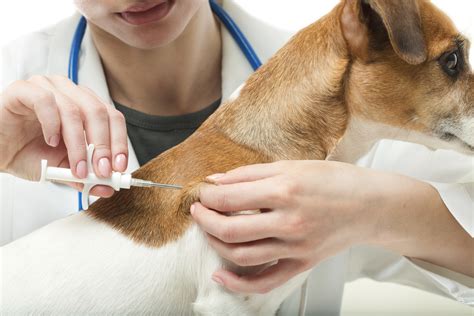Learn about common vaccines for dogs, vaccination schedules for puppies and adult dogs, and the importance of booster shots. Find answers to your vaccination questions here.
Understanding Canine Vaccinations
Dogs, just like humans, are susceptible to various diseases. This is why it is important for every dog owner to understand the importance of canine vaccinations. Vaccinations can protect dogs from potentially deadly illnesses and help to prevent the spread of these diseases within the canine population. By understanding canine vaccinations, you can ensure that your furry friend stays healthy and happy.
When it comes to canine vaccinations, there are several common vaccines that dogs should receive. These include vaccines for diseases such as rabies, distemper, parvovirus, and adenovirus. Each of these vaccines plays a crucial role in protecting dogs from serious and sometimes fatal illnesses. It is important for dog owners to familiarize themselves with the specific vaccines that are recommended for their pet’s age, breed, and lifestyle.
Additionally, it is essential for dog owners to adhere to a vaccine schedule for their pets. This schedule will outline when each vaccine should be administered and ensure that your furry friend receives the necessary protection at the appropriate times. By following a vaccine schedule, you can help to safeguard your dog from preventable diseases and minimize the risk of illness and infection.
Common Vaccines for Dogs
When it comes to protecting our furry friends, vaccines play a crucial role in preventing various diseases and illnesses. As dog owners, it’s important to be aware of the common vaccines for dogs that are recommended by veterinarians to ensure the health and well-being of our beloved pets.
One of the most common vaccines for dogs is the rabies vaccine. This vaccine is not only important for the health of your dog, but also for your own safety, as rabies is a deadly disease that can be transmitted to humans. Another essential vaccine for dogs is the distemper vaccine, which protects against a highly contagious and potentially fatal virus that affects the respiratory, gastrointestinal, and nervous systems of dogs.
Additionally, the parvovirus vaccine is another crucial vaccination for dogs, as parvovirus is a highly contagious and potentially fatal disease that affects the gastrointestinal tract of dogs. Other common vaccines for dogs include those for hepatitis, leptospirosis, and canine influenza. Consult with your veterinarian to determine the vaccine schedule for your dog and to ensure that they are up to date on all necessary vaccinations.
Vaccine Schedule for Puppies
When bringing a new puppy into your home, it’s important to prioritize their health and well-being. One critical aspect of their care is ensuring they receive the essential vaccinations to protect them from various diseases and illnesses. The vaccine schedule for puppies is designed to provide these young dogs with the necessary immunity to keep them healthy and happy.
One of the first vaccinations a puppy will receive is the distemper, hepatitis, parainfluenza, and parvovirus (DHPP) vaccine, also known as the core vaccine. This vaccine is typically given in a series of three shots, starting when the puppy is around 6 to 8 weeks old and continuing every 3-4 weeks until they are 16 weeks old. The rabies vaccine is another crucial vaccination for puppies, often administered when the puppy is around 12-16 weeks of age.
In addition to these core vaccinations, there are other non-core vaccines that may be recommended based on the puppy’s lifestyle and environment. These may include vaccines for leptospirosis, bordetella, and Lyme disease. Consulting with a veterinarian is essential for determining which vaccinations are necessary for your particular puppy, as they can provide personalized recommendations based on the puppy’s health status, lifestyle, and risk factors.
Vaccine Schedule for Adult Dogs
As responsible pet owners, it’s important to understand the vaccine schedule for adult dogs in order to keep our furry friends healthy and protected. When it comes to adult dogs, there are several core vaccines that are recommended by veterinarians. These vaccines include rabies, distemper, parvovirus, and adenovirus. These core vaccines are crucial in preventing serious and potentially life-threatening diseases in adult dogs.
Along with core vaccines, there are also non-core vaccines that may be recommended based on your dog’s lifestyle and risk of exposure. These non-core vaccines include Bordetella, Leptospirosis, and Lyme disease. It’s important to discuss with your veterinarian which non-core vaccines are necessary for your adult dog based on their individual needs and potential exposure to certain diseases.
It’s important to adhere to the recommended vaccine schedule for adult dogs in order to ensure that they are fully protected against common diseases. Typically, adult dogs should receive booster shots for core vaccines every 1-3 years, depending on the specific vaccine and your dog’s individual health and risk factors. By staying up to date with your dog’s vaccinations, you can help prevent the spread of disease and keep your furry companion happy and healthy for years to come.
Vaccine Side Effects to Watch For
When it comes to canine vaccinations, it’s important for dog owners to be aware of the potential side effects that can occur after their pet receives a vaccine. While immunizations are crucial for protecting dogs against diseases such as rabies, distemper, and parvovirus, it’s also essential to recognize the signs of adverse reactions to the vaccines.
Some common side effects of dog vaccines include lethargy, loss of appetite, and slight fever. These symptoms are usually mild and temporary, resolving on their own within a few days. However, it’s crucial for dog owners to be aware of more serious side effects that may occur, such as severe allergic reactions or anaphylaxis.
It’s important for dog owners to closely monitor their pets after they receive a vaccine, and to seek veterinary care if their dog experiences unusual symptoms or reactions. By being aware of the potential side effects of canine vaccines, dog owners can take the necessary precautions to ensure the safety and well-being of their beloved pets.
Importance of Regular Booster Shots
Regular booster shots for dogs are an essential part of their preventive health care. These vaccinations are important because they help to ensure that your dog’s immune system is continuously protected against various infectious diseases.
Booster shots are necessary because the immunity provided by vaccines wears off over time. Without regular boosters, your dog may become susceptible to potentially life-threatening illnesses. By keeping up with booster shots, you can help protect your furry friend from diseases such as rabies, distemper, parvovirus, and canine hepatitis.
Consulting with a veterinarian is crucial to determine the appropriate vaccination schedule for your dog. They can provide guidance on which vaccines are necessary based on your dog’s age, lifestyle, and risk of exposure to certain diseases. By staying current with booster shots, you can help ensure a long and healthy life for your beloved pet.
Consulting with a Veterinarian
Consulting with a veterinarian is an important step in ensuring the health and well-being of your dog. Whether you are getting a new puppy or have an adult dog, regular check-ups with a veterinarian can help in keeping your furry friend healthy. A veterinarian can provide valuable advice on vaccine schedule for puppies, vaccine schedule for adult dogs, and importance of regular booster shots.
During the consultation, the veterinarian will also discuss any vaccine side effects to watch for, which is important for dog owners to be aware of. It is crucial to communicate any concerns or observations about your dog’s health to the veterinarian during the consultation. This can help in early detection of any health issues and provide timely treatment.
Moreover, consulting with a veterinarian is an opportunity to seek guidance on understanding canine vaccinations and common vaccines for dogs. A veterinarian can provide personalized recommendations based on your dog’s lifestyle, environment, and health history. Therefore, it is essential to prioritize regular consultations with a veterinarian to ensure that your dog receives the necessary care and vaccinations.
Frequently Asked Questions
What vaccinations are essential for dogs?
The core vaccinations every dog should receive include rabies, canine distemper, canine parvovirus, and canine adenovirus.
At what age should puppies start their vaccinations?
Puppies should start their vaccinations at 6-8 weeks of age, with booster shots every 3-4 weeks until they are 16 weeks old.
What is the importance of vaccinating your dog?
Vaccinating your dog is important to protect them from serious and potentially fatal diseases, as well as to prevent the spread of these diseases to other animals.
Are there any potential side effects of vaccinations for dogs?
While rare, potential side effects of vaccinations for dogs can include mild fever, lethargy, and swelling at the injection site. Serious reactions are extremely rare.
Can unvaccinated dogs pose a risk to other pets?
Yes, unvaccinated dogs can pose a risk to other pets by spreading diseases such as rabies, parvovirus, and distemper, especially in areas with a high dog population.
How often should adult dogs receive vaccinations?
Adult dogs should receive booster vaccinations every 1-3 years, depending on the specific vaccine and the dog’s risk of exposure to certain diseases.
What should I do if I miss a scheduled vaccination for my dog?
If you miss a scheduled vaccination for your dog, consult with your veterinarian to determine the best course of action, which may include restarting the vaccination schedule or giving a booster shot.





